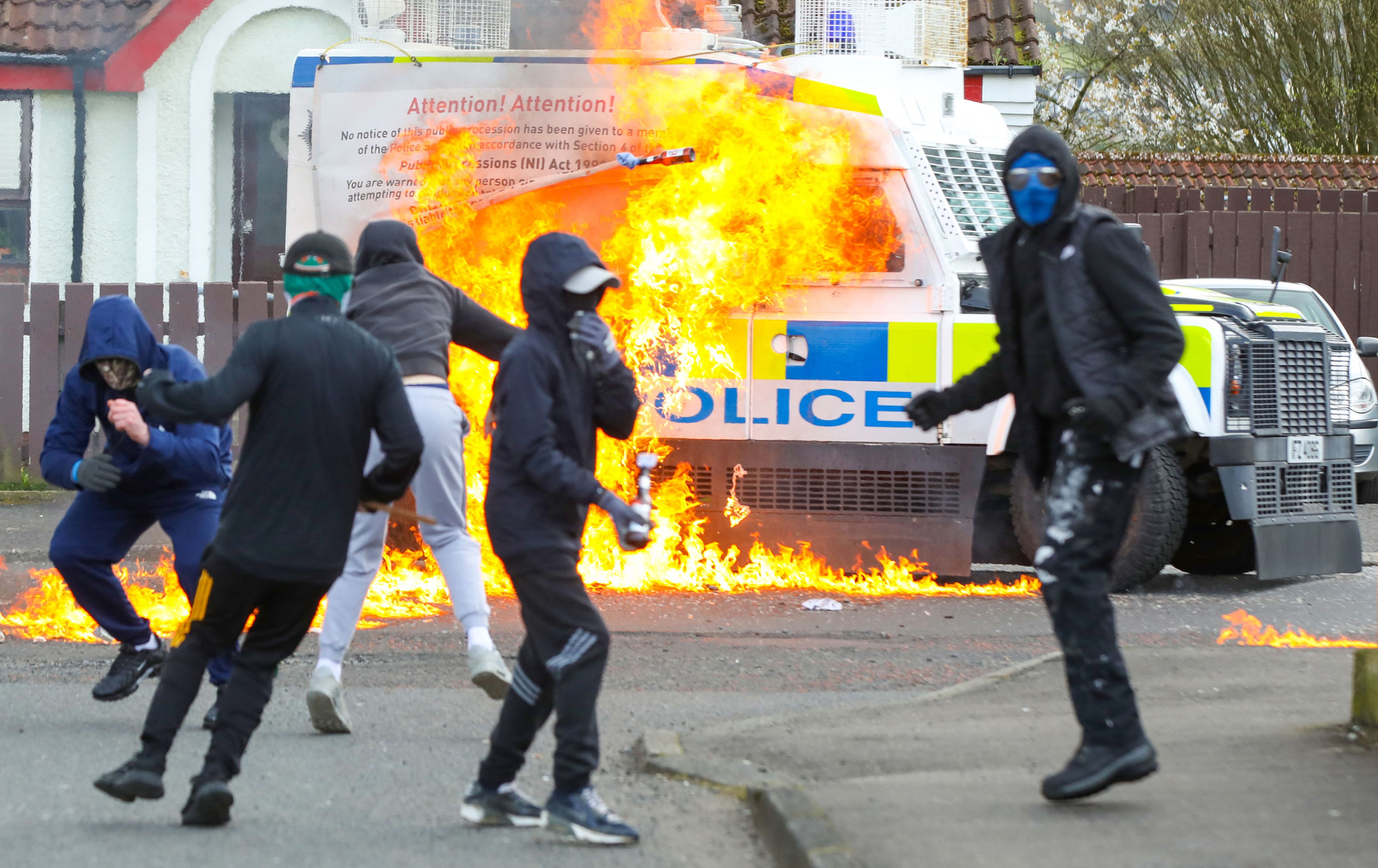Northern Ireland police officers ‘could be driven from homes’ as data breach declared ‘critical incident’
Terrorist claims to have accessed data will ‘increase the day-to-day pressure on officers’, expert tells The Independent
Your support helps us to tell the story
From reproductive rights to climate change to Big Tech, The Independent is on the ground when the story is developing. Whether it's investigating the financials of Elon Musk's pro-Trump PAC or producing our latest documentary, 'The A Word', which shines a light on the American women fighting for reproductive rights, we know how important it is to parse out the facts from the messaging.
At such a critical moment in US history, we need reporters on the ground. Your donation allows us to keep sending journalists to speak to both sides of the story.
The Independent is trusted by Americans across the entire political spectrum. And unlike many other quality news outlets, we choose not to lock Americans out of our reporting and analysis with paywalls. We believe quality journalism should be available to everyone, paid for by those who can afford it.
Your support makes all the difference.Police officers in Northern Ireland could be forced to move homes and quit their roles over security fears caused by a “monumental” data breach, a senior policing figure has warned.
The Police Service of Northern Ireland (PSNI) has apologised, and declared a “critical incident” on Wednesday, after the identities of some 10,000 officers and staff were published online – with the force’s chief Simon Byrne set to cut short his holiday to face tough questioning.
In the force’s response to a routine Freedom of Information request – potentially visible to the public for up to three hours – a table was embedded revealing the rank and grade data, surnames, first name initials, location and departments for all PSNI employees.
And on Wednesday, it emerged that PSNI was also investigating a second data breach, with a police-issue laptop, radio, and spreadsheet containing the names of more than 200 serving officers and staff believed to have been stolen from a private vehicle in Newtownabbey on 6 July.
Liam Kelly, chair of the Police Federation for Northern Ireland, which represents rank-and-file officers, told the BBC’s Today programme he had been “personally inundated with officers who are outlining that they are shocked, dismayed and basically angry that this has happened”.
“Our officers go to great lengths to protect their identities. Some of them don’t even tell their close friends and associates that they are actually in the police,” he said, adding that in his 29 years of policing he has “never experienced something like this”.
Speaking to Sky News, he warned that some police staff could have to move homes “and may not be able to continue in their current roles”, which he conceded could have an operational impact on the force as a whole.
Ian Acheson, a senior adviser at the Counter Extremism Project, told The Independent that “police officers in Northern Ireland don’t need much of an excuse to look for another job at the moment”.

“You’ve got to see this in context – not just of the security situation and the severe threat from dissident Republican terrorists – but also in relation to swingeing budget cuts, which the chief constable has said will result in falling numbers of officers,” Mr Acheson said.
“So when you add that to the fact that their own organisation cannot even protect them and their personal data from being released, I think you’d get quite a big push factor there for people to say, ‘well, this is just not worth it for me’.”
Even if “bad actors” have not gained access to the information while it was visible, “terrorists will use the possibility” that they have seen it, to capitalise upon its “psychological, manipulation and propaganda value, and all of that just increases the pressure day-to-day on police officers”, he added.
While police chiefs have stressed that no addresses were released in the breach, Mr Acheson said: “Northern Ireland’s the size of Yorkshire ... It’s a very intimate community, and police officers can only live in certain areas.”
Pointing to the “very severe threat from dissident Republican terrorists who have got form for trying to murder police officers”, he added: “This isn’t a kind of fantasy. I think the anger and fear is legitimate and authentic in this case.”
The threat level in Northern Ireland was raised to “severe” by MI5 in March, a month after senior detective John Caldwell was shot by gunmen while coaching children’s football in County Tyrone.
Earlier this year, Chief Constable Byrne said he receives briefings almost every day about plots to attack and kill his officers, adding that the ongoing threat from dissident Republicans remained a “real worry”.
Mr Byrne was said to be cutting his holiday short to face questions over the breach, with the Northern Ireland Policing Board set to hold a crisis meeting on Thursday.

Alliance Party leader Naomi Long said it was of concern that a member of staff, who she understands to be “relatively junior”, had access to this sensitive data – warning that it raised questions of data within the PSNI which will “need to be answered robustly to the Policing Board”.
Mr Acheson also warned the breach would be of interest to “poly-criminals who are operating out of the paramilitary sphere and into drugs dealing and organised crime”.
“One of the significant things about this data breach is that names have been attached to not just to police locations but departments ... that is really bad news,” the counter-extremism expert said.
“Because there you are seeing the individuals who are working in liaison with MI5, for example, or paramilitary crime task forces, and that information will be of great interest to people who rely on coercive control in their communities to corner the drugs market. So it is a catastrophic breach.”
But while some officers may be forced to move roles, the PSNI “should be able to maintain its current operational status”, Dr Jonny Byrne, a senior lecturer in criminology at Ulster University told The Independent.
“I don’t think it will prevent officers from doing their jobs but it might put some doubt in the minds of some officers about their sense of security.”
While the breach may prove to be “the final straw” for some officers “already disgruntled with the job”, Dr Byrne suggested that the vast majority “will simply seek reassurance that risk has been managed and that it will not happen again”.
He added: “It is important that the public trust the police in terms of what they do with their personal data and information – this incident places strain on that relationship and again places some doubts in the minds of the people in which the PSNI serve.”





Join our commenting forum
Join thought-provoking conversations, follow other Independent readers and see their replies
Comments